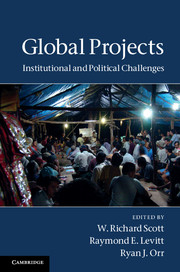Book contents
- Frontmatter
- Contents
- List of figures
- List of tables
- List of contributors
- Preface
- Introduction: studying global projects
- Part I Foundational themes
- Part II Institutional differences and global projects: empirical studies
- 4 Rules versus results: sources and resolution of institutional conflicts on Indian metro railway projects
- 5 Institutional exceptions on global projects: a process model
- 6 Local embeddedness of firms and strategies for dealing with uncertainty in global projects
- 7 Who needs to know what? Institutional knowledge and global projects
- Part III Political conflicts and global projects
- Part IV Governance strategies and structures
- References
- Index
4 - Rules versus results: sources and resolution of institutional conflicts on Indian metro railway projects
Published online by Cambridge University Press: 05 June 2012
- Frontmatter
- Contents
- List of figures
- List of tables
- List of contributors
- Preface
- Introduction: studying global projects
- Part I Foundational themes
- Part II Institutional differences and global projects: empirical studies
- 4 Rules versus results: sources and resolution of institutional conflicts on Indian metro railway projects
- 5 Institutional exceptions on global projects: a process model
- 6 Local embeddedness of firms and strategies for dealing with uncertainty in global projects
- 7 Who needs to know what? Institutional knowledge and global projects
- Part III Political conflicts and global projects
- Part IV Governance strategies and structures
- References
- Index
Summary
As indicated by previous chapters, an increased need for public facilities and infrastructural improvements of all kinds – transportation, energy production and distribution, clean water, and sanitation – has led to a rapid rise in the volume of activity in the international construction industry in recent times – in particular, in developing countries. As a consequence, we observe an increase in the number of large “global projects” that involve collaboration among participants from multiple companies and countries.
In addition to the complexities present in most large engineering projects, global projects are distinct from nonglobal projects in that the former involve the necessity to interact with individuals, firms, and agencies from diverse national and cultural backgrounds. As a consequence, participants confront a variety of institutional differences – including regulatory, normative, and cultural-cognitive disparities with which they must attempt to cope (see Chapter 2; Scott 2008). The existence of these differences presents substantial challenges to global projects, imposing associated “institutional transaction costs” requiring time, attention, and the expenditure of additional resources (see Chapters 1 and 5).
A case study was carried out to investigate the types of challenges posed by institutional differences in one large construction project. In addition to examining institutionally based conflicts, we identified some of the ways in which these conflicts were resolved and, in particular, the types of actors who were instrumental to their resolution.
- Type
- Chapter
- Information
- Global ProjectsInstitutional and Political Challenges, pp. 113 - 134Publisher: Cambridge University PressPrint publication year: 2011
- 6
- Cited by

